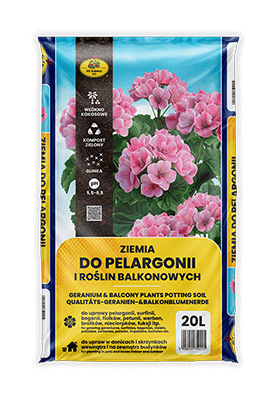



• Cultivation of most balcony plants, including: geranium, surfinia, begonias, violets, petunia, verbena, pansies, impatiens, fuchsia, and other profusely flowering plants
• Planting in pots and boxes
• On balconies, terraces and in the garden
• Inside and outside buildings
• Peat
• Green compost
• Coconut fiber
• Clay
• Fertilizer
• Salinity: <2,5 g/l
• Structure: 0-20 mm
• The best time for planting is spring
• The product is mechanically pressed - before use it is recommended to loosen it and, if necessary, when the surface is dry, soak it with water
• The day before transplanting, water the plant generously.
Transplanting
• Choose a clean pot or box with drainage holes - larger than the root ball
• Pour the drainage to the bottom of the container (e.g. expanded clay), then partially replenish with geranium substrate
• Carefully remove the root ball, remove gently dead roots, loose the twisted ones
• We put the plant (it should grow at the same depth) and fill the pot with geranium substrateup to 2 cm below the edge
• After transplanting, lightly knead the soil and water it abundantly for the first time
• It is recommended to start fertilizing 3-4 weeks after transplanting
• Geraniums and other balcony plants prefer well sunny places
Soil crops / greengrocer
• Spread the geranium substrate to a depth of about 15-30 cm
• Then we plant plants
• Immediately after transplanting, water moderately
• We recommend starting fertilization 6-8 weeks after transplanting.
Practical advice
• The pot should be at least 20 cm in diameter, the balcony box - at least 15 cm wide
• Containers with smaller dimensions will not provide plants with enough space for the proper growth of the root ball, thanks to which the substrate will dry out very quickly
• Pots with plants should be kept in the constant humidity possible
• A change in the color of the substrate indicates the state of its humidity and the need for watering
• Excessive watering can lead to the development of algae in the so